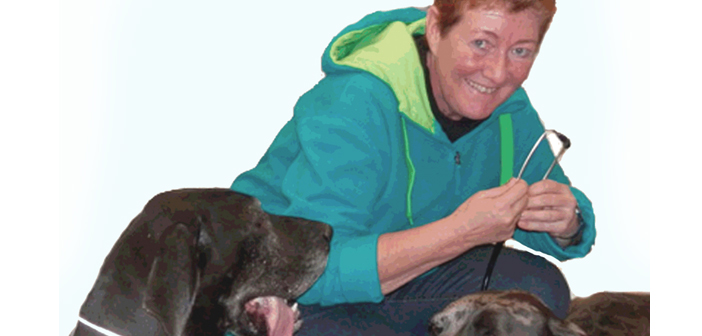According to recent statistics released at #Interzoo2018, pet-ownership in Germany is on the rise. Almost half of all households in Germany have a pet, as compared to one third just ten years ago. Strong regulations limiting veterinary work hours, however, may soon put the German veterinary profession in a proverbial pickle. The German Veterinary Practitioners Association is working diligently to address the issues.
Veterinary care has also advanced dramatically in Germany, but due to tight working regulations and the complexities of the life/work balance of the next generation of veterinarians, Germany may soon see a shortage of available veterinarians to meet the ever-increasing amount of pet owners that need veterinary care, especially in remote areas or those with critical needs. That was just one of the many issues discussed as Goodnewsforpets editor Lea-Ann Germinder visited with Dr. Petra Sindern at Interzoo 2018. Dr. Sindern has been a practicing veterinarian since 1983. She owns a small animal practice with one nurse in Neu Wulmstorf in nearby Hamburg. She is also Vice President of the German Veterinary Practitioners Association (bpt) www.tieraerzteverband.de, a lobbying organization representing 60 percent of German veterinary practitioners who voluntarily pay membership fees.
Dr. med. vet. Petra Sindern
“Pet owners in Germany care very much about their pet friends. About half of the dog owners and about a third of the cat owners carry out a regular and routine care program. About 20 percent more see their vets at least once a year. The other cat and dog owners and those who keep small mammals, exotic pets etc. primarily visit the vet for acute treatment or surveillance of chronic problems like correction of the teeth,” she said.
As in the U.S. cats are becoming more popular. About 40 – 50 percent of the patients in the average German small animal practice are cats. During the last few years, feline medicine has taken some very big steps, even heart or brain surgery or oncologic radiation are performed successfully. According to Dr. Sindern, four years ago the German Veterinary Practitioners Association (bpt) began to establish a project improving the feline handling skills of vets and nurses with Service Plus for Cats, a first step model program toward developing a Cat-Friendly Clinic Certificate.Acc
Veterinary dentistry is practiced in nearly every clinic or practice. Primarily veterinarians do cleaning or extraction of teeth in dogs or cats and correction of malformed teeth by rotating tooth cutters in rabbits, guinea pigs etc. This requires a very good management of general anesthesia. There are specialized colleagues who perform tooth filling, occlusal splints, crowns etc.
Seeking Veterinary Care and Pet Food Recommendations
The five top medical issues that German pet owners seek out their veterinarians for are:
- Vaccinations
- Anti-parasite treatment
- Vomiting and diarrhea
- Chronic kidney failure
- Acute injuries in cats which have been fighting each other
The explosion of varieties and desire for raw or natural ingredients in pet foods and treats in Germany is the same as in the United States. Animal nutrition is one of the subject vets and nurses are trained in. In daily practice, it is impossible to know every new brand. Most vets advise their customers more generally for their daily feeding practice (protein, fat, dry, canned etc.). Several companies carry out their own training programs for nurses to advise their prescription diets. For these foods, owners normally seek advice first within their veterinary practice.
Dr. Sindern with her patients
Getting Information From Dr. Google – The Good and the Bad
Pet owners in Germany use Dr. Google just as in the U.S. Pet owners come into the practice pre-educated by “Dr. Google.” Now social media and the Internet is integrated into the practices themselves. In fact, according to Dr. Sindern, a lot of German vets use Facebook, email or homepages for communicating with their clients. A staff person or a consultant may manage the process. This makes it easier to supply their own opinion to special topics, remind owners on revaccination data or sending and discussing laboratory findings. Electronic communication is also important between vets working on the same patient from different approaches or in different cities. While early on veterinarians dismissed the Dr. Google and later social media phenomena, the research can be helpful in getting the pet owner to visit the veterinarian.
Dr. Sindern says, “Older vets like me are very amused to tell people, that it is not the complicated “protein intoxication” (whatever this should be :-), but a simple misintake of puddle water which has caused the intestinal symptoms. But sometimes I am really happy that they have looked into Facebook, etc., because they come to know that their pet might really have a severe problem. This gives us vets a chance to start treatment early enough. So it is like always, nothing is only bad or only good.”
Regulations Of Prices Are Different In Germany vs. U.S.
Sindern cited the main difference between Germany and the United States or other European countries is the strict regulations. This applies to managing veterinary expenses, the dispense of medications and the shortage of veterinarians who actually go into practice. In order to help pet owners manage expenses, many countries have managed wellness plans and pet insurance as options. German vets are by law obliged to charge their clients within a range of fixed tariffs. This means that they cannot set up health or wellness plans with precalculated fixed costs or packages like geriatric checks etcetera, which would make it easier for owners to predict potential costs.
In Germany, pet insurances are permitted and there are four companies, which offer insurances. About seven percent of dog and cat owners have their pets insured, mostly only for the partial or full refund of surgery costs. Insurances only cover the range from one to twice the amount of the fixed tariff. This can be sold as a package, but it may not be undersold. Discounts may by law only be offered for two exceptions: the castration of male or female wild living cats, which have to be released into the wild as soon as they awake.
The Regulation of the Veterinary Pharmacy
Although German vets are free to prescribe and treat animals as a profession, Germany has strong prescribing regulations. In addition to the economic challenge of not being allowed to calculate prices based on real costs, German veterinarians have strict regulations on how to handle antibiotic treatment in cats and dogs and which substances can be applied or not. German vets have the right to sell medications to their own clients, but a strict unannounced and expensive control of their pharmacy – part of the clinics and practices – is carried out by the official veterinary regulatory organizations.
The regulation of medications in Germany is especially important in the dispense of treatment of food animals in remote areas. This is often life – saving for thousands of them, that medication is immediately available even in very remote areas. In principle, both online and regular pharmacies could sell prescription medicine to pet owners, but this would require a prescription, which has by law to be issued by a vet and charged. Thus, this extra cost means buying prescription drugs at their own vet makes medication cheaper and it saves the owners a lot of time.
German vets have the right to sell medications to their own clients only. Over the counter pet medications on the other hand can be sold by any pharmacy to any pet owner, but vets may only sell them to their own clients. It is strictly forbidden for pharmacists and vets to use a human formulation, which contains the same ingredients as the veterinary one, if a veterinary product is on the market and if it is available. Vets are strongly controlled, pharmacists are not.
Regulation of Work Hours and A Looming Veterinary Shortage
Regulation of work hours is strictly controlled in Germany. A German employee may not regularly work more than eight hours a day without getting at least 18 hours off on the following day. It has become more and more difficult to find staff (vets and nurses) for the emergency care cases. This means that veterinary practices have to have three vets for a 24-hour emergency clinic. Employees may not work more than 10 hours, and then you must have 18 hours off. You may not work more than 48 hours a week. You may not work 10 hours a day on a regular basis, just very exceptionally and with a very good explanation (like being in the middle of life -saving surgery etc.)
When employees work eight hours or less, they can work the next day. This is a problem especially in horse practices, where vets up to now work 10 hours a day or more. Recently a small animal clinic had to pay a punishment of 50,000 euros because of not having their vets staying at home for those 18 hours.
The economics of veterinary school are quite different in Germany. The good news is attending a college or a university in Germany does not cost anything, students only pay for their living and for books etc. This is one of the reasons, why, as no large and expensive credits have to be refinanced, about 30 percent of veterinary students never start to work as a vet after graduating veterinary school. One primary reason students do not go on to practice veterinary medicine is a lot of practices cannot afford to pay associates because of the tariff situation. Low salary professions like veterinary doctors are also less attractive to male students.
In explaining the dynamics of the emerging veterinary school classes, Dr. Sindern says, “About 90 percent of the new students are female. After finishing veterinary school, most of them want to work part-time. As soon as they get pregnant, they must immediately stop work unless they are self-employed. This means a severe gap in career and about 40 percent never go back to practice again.
Working To Solve the Issues
The veterinary organizations of several European countries are working collaboratively to address the issues of work/life balance, regulations and the shortage of practicing veterinarians. Sindern’s organization is now negotiating with the German government to have an exception in law like in Switzerland, where vets may work more than eight hours and may work the next day as well. This is important, because animal welfare (also for food producing animals) would suffer if there were not enough vets to take care of them. They would very much appreciate another selection process for new students, who are more motivated to work full time in areas where they are needed. But at this time all of the five German veterinary colleges have yet to change their processes.
One thing we know for sure – both veterinarians and pet owners care deeply about our furry companions and whatever the issues at hand, the volunteer leaders of the veterinary profession are working hard to solve them. It is the reason Dr. Sindern as a practicing veterinarian, and the rest of her volunteer colleagues, took on this substantial time commitment for the profession — to provide the best possible care for animals in Germany now and in the future.
Editor’s Note: Interzoo plans to have an expanded veterinary program in place for #Interzoo2020. No details were available at publication time.
Read our prior report on Interzoo:

